Vale of the misunderstood: Report from the Pankisi Gorge
Report from the Pankisi Gorge
A report by Novaya Gazeta-Europe correspondents Fariza Dudarova and Vlad Dokshin from the Pankisi Gorge on how Georgian Chechens are improving Pankisi’s reputation and building a tourist paradise.
“Journalists are not friends of the locals. In the ten years I’ve been working here, they come here and write articles about how dangerous it is. But as a tourist I have been to many countries and nowhere do I feel safer than here. Women are trying to develop tourism, but journalists are getting in the way. I hope we understand each other.”
British Gurjit Singh – wide trousers, hair hidden by a colorful turban – sits at the head of the table, his elbows confidently on the table and his chin resting on his fists. He pauses and looks at us with his attentive black eyes, slightly tilting his head. We have no chance of not understanding it.
Our visit to Pankisi – intriguing, patriarchal, misunderstood – began with this admonition.
The Kist people have been living in the gorge for several centuries, descendants of Chechen settlers in the 18th-19th centuries. In the 1990s and early 2000s more than six thousand refugees from Chechnya, forced to leave their homes during the two Chechen wars, found shelter here. Since then the public image of Pankisi has been inextricably linked with terrorism; Ichkerians took refuge here, for example detachments of Ruslan Gelaev. In 2002 Russia launched several air strikes on the gorge owing to this.
- Alarm bells ring for Pankisi gorge – the echo of the Syrian war reaches Georgia
- Why did Georgian special forces kill 19-year-old Temirlan Machalikashvili? New data and questions for the investigation
The war in Chechnya ended, but Pankisi was not “pacified” immediately. In 2015 several dozen young men left to fight in Syria; the emir of the Islamic State, Abu Umar al-Shishani, also came from Pankisi. Thus the gorge’s reputation as a “hotbed” of terrorism has been cemented. But now local residents are trying to debunk the image of the “criminal Pankisi Gorge” and develop tourism — salvation for a region with total unemployment.
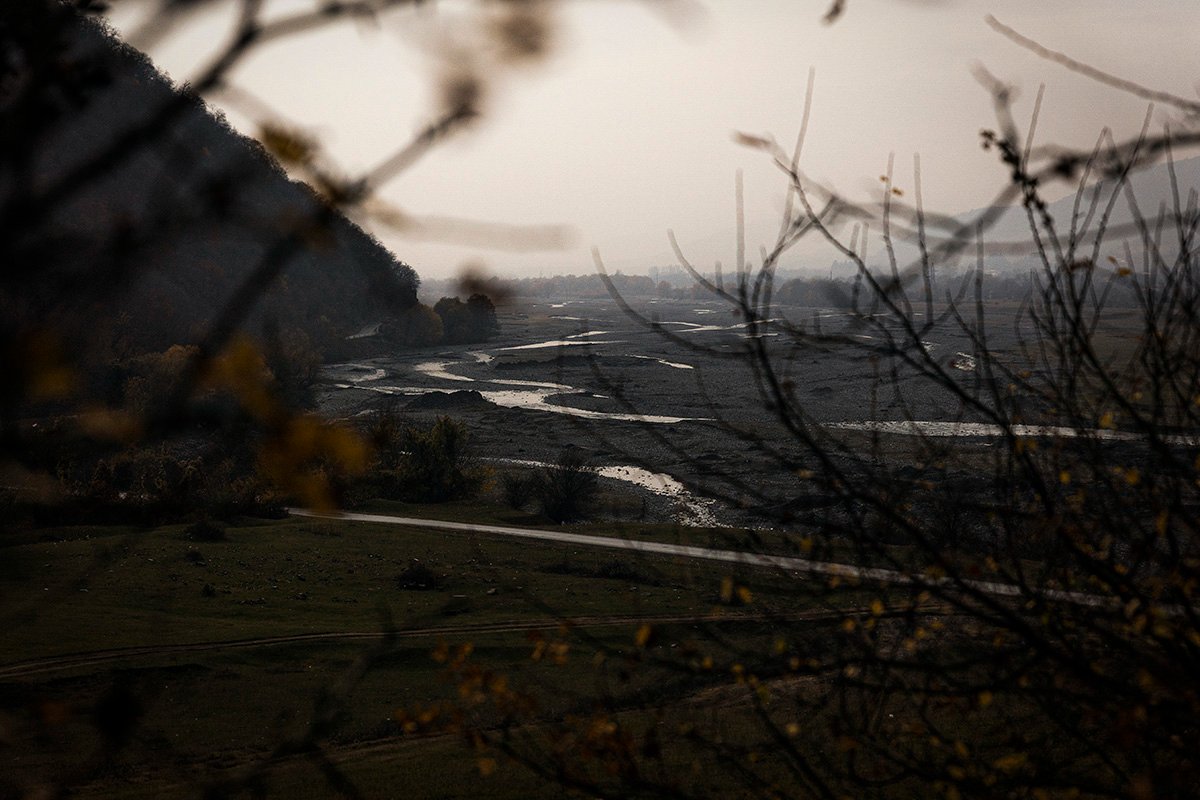
The gorge borders Dagestan and Chechnya. Russia is thus only 60km away, separated by a mountain range. In the upper reaches of the Alazani River there are several settlements of Kists. The ancestors of modern Kists appeared in the gorge at the beginning of the 19th century. The first who moved here was called Dui, a Chechen village of Bechiga. According to his great-granddaughter Nona Khangoshvili, Dui moved his family to Pankisi due to a conflict that turned into a blood feud. Newly settled Chechens in the valley were offered a reduced tax rate by local authorities if they took Georgian surnames, so, most local residents’ surnames end in “shvili”, and in addition to their native language people here are fluent in Georgian.
Getting from Tbilisi to the northernmost point of Georgia, the gorge, is not easy — there is no permanent transport, one must take an expensive taxi and drive two and a half hours along mountain roads. During this ride the view changes dramatically; the busy fashionable capital streets are replaced by abandoned, destroyed Soviet panels, then they too disappear from sight and small villages with neat houses begin, where small shops are the only infrastructure. From the flags of the Chechen Republic of Ichkeria and Saudi Arabia hung on the fences (“because Islam came from there”), one can immediately understand where the villages inhabited by Kist Muslims begin.
“There is no such thing in Chechnya”
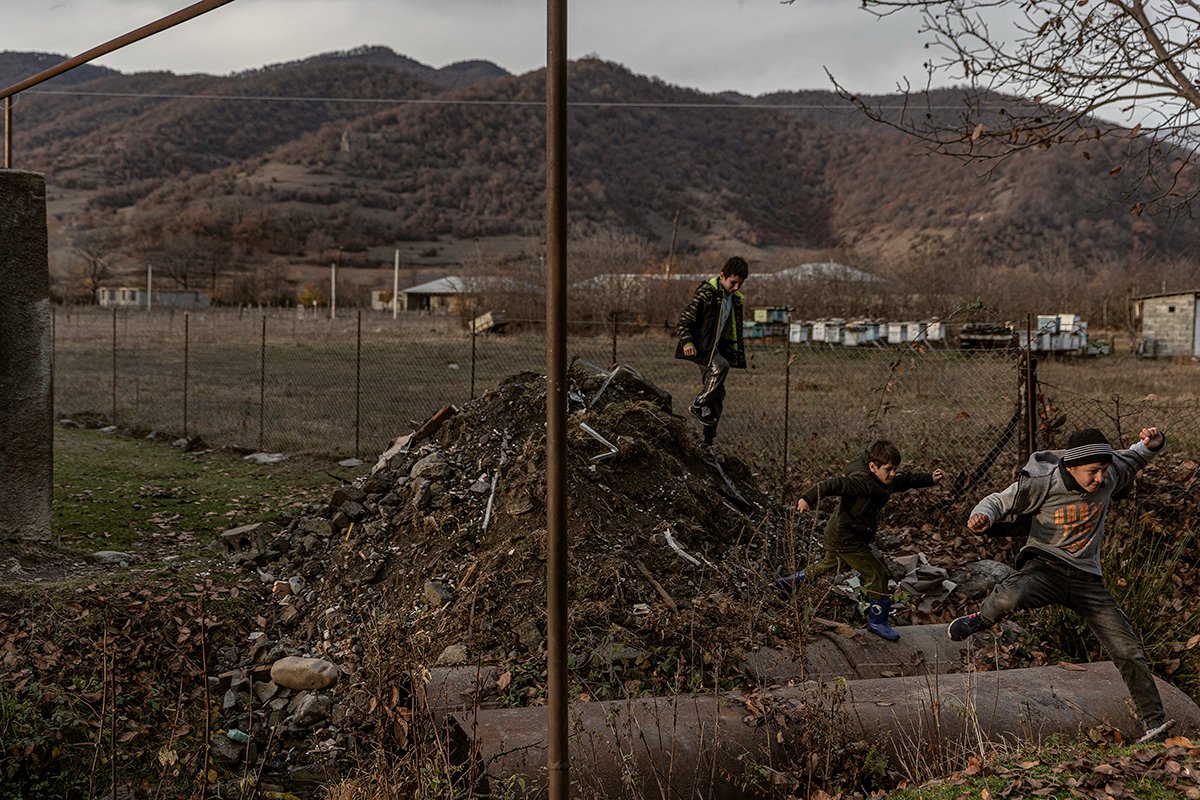
Photo: Vlad Dokshin / Novaya Gazeta Europe
In the last village of the Jokolo gorge, which we reached after sunset, there is a guesthouse run by a local resident Nazi Dakishvili where we stayed for a few days.
Nazi is a young, dark-haired Kist who used to work as a lawyer in Tbilisi and now runs her own business in her native village. From the information leaflet in the guesthouse, you discover that Nazi has created an association for the development of tourism in Pankisi which helps local people open businesses, mainly guesthouses, and seek investments. There is an impression that it is mostly women involved in this business.
The guesthouse is located in a beautiful white longhouse built by her grandfather in 1948. The mistress of the house greeted us cordially, but when she found out that we were journalists, she became wary.
- “We were visited by journalists from various publications, which we considered respected. We accepted them, and then they published articles where they speculated on terrorism, saying that it was dangerous here. And we have been calm and safe for many years,” Nazi tells us in English, and then, having learned that I understand Kistin [one of the dialects of the Vainakh language. — auth.], switches to that language. She warns us that the locals do not like to communicate with the media, and adds that in recent years she has not allowed journalists into her guesthouse. For us, however, Nazi makes an exception.
Gurjit Singh helps Nazi with developing tourism in the area, and helps us get oriented. He came here as a tourist about ten years ago, fell in love with the place and stayed. He is a talented photographer, and the guesthouse’s website is his work.
Nazia has a separate outbuilding in the yard with a long conference table, computers and racks of photo albums that Singh has collected.
Then, for more than half an hour, Gurjit tells us about Pankisi and about the work of women such as Nazi in supporting their villages. He tells us that it is women who play a key role in the social life of the gorge, they are behind education and healthcare, they are creating a positive image of Pankisi. And journalists often interfere with this hard work, holding back the flow of tourists. Occasionally I have the feeling that it’s up to us to change this imression of journalists.
Gurjit mentions the House of Culture, located in the main village Duisi, a half-hour walk from Nazi’s house. We headed there afterward.
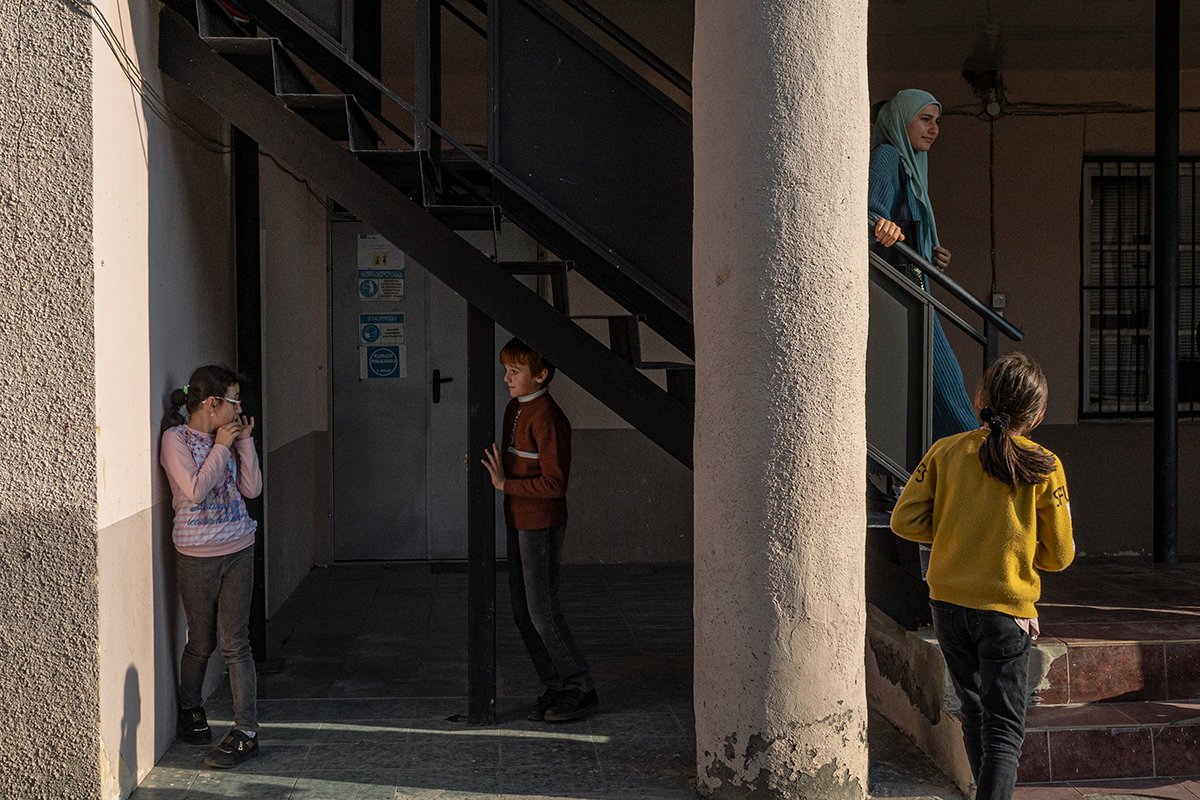
The House of Culture is a white two-story building, where the regional development fund now functions. Children, teenagers and women come here for courses in history, English and Georgian, dancing, knitting and cooking.
A skinny maid with a bucket in her hand escorts us to the second floor, leads us into a small room with an oval table that looks like a classroom. Looking closely, I notice a plaque on the wall with the inscription “Women’s Council” in English and Georgian. I ask Development Fund coordinator Kameta Temirbulatova if there is really a women’s rights organization in the middle of the mountains in a village considered patriarchal, and she proudly replies: “Yes, for a dozen years we have been helping local women who are faced with various problems.”
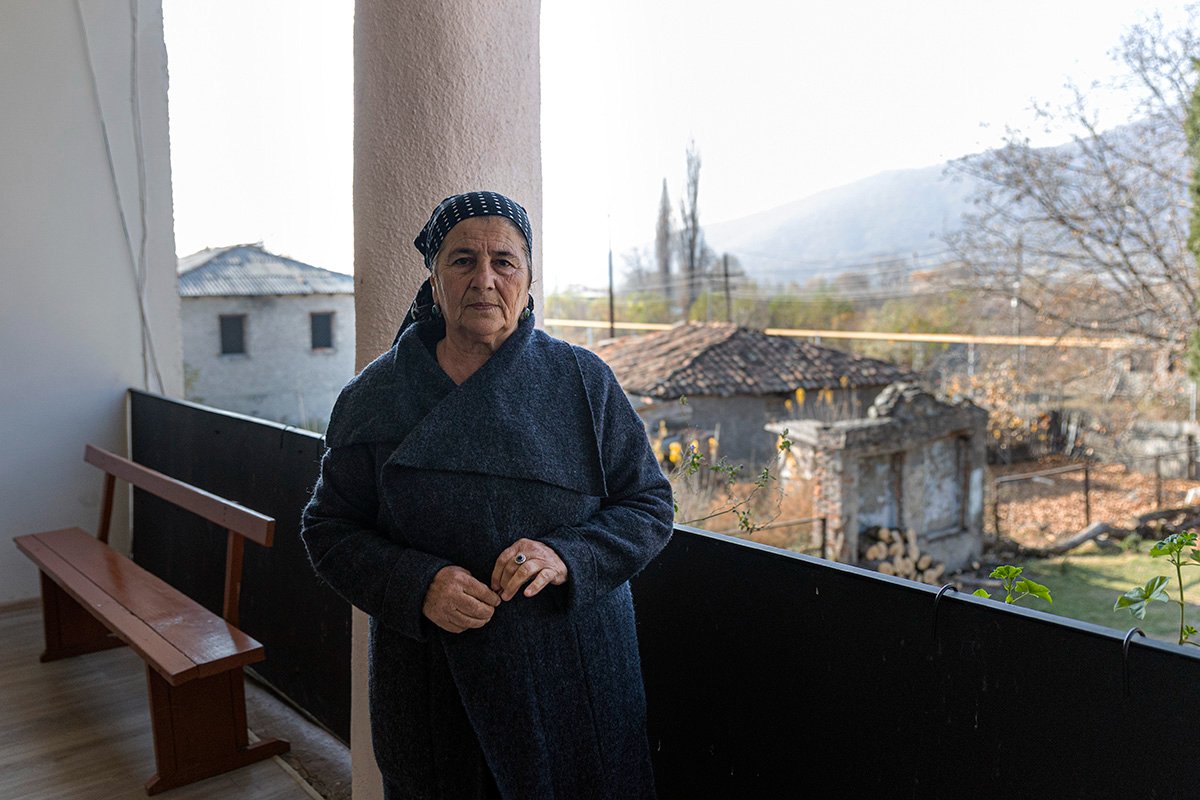
Getting into the Council is not so easy — all the women working there are elected by local residents. Eteri Tsikhesashvili, 68, was one of those elected to the Council in 2011. She greets us warmly and it seems that all those whom we met in Pankisi, she was the most open to conversation. Eteri is a short active woman, wearing a dark headscarf and bright emerald earrings. While Chechens and Ingush in the North Caucasus often use Russian words in their native language, Eteri mixes Kist and Georgian. When she does not know how to formulate a sentence in Kist, she says it in Georgian and asks her colleagues to translate it into Russian, which she barely speaks. From time to time, she, as if apologizing, repeats that she does not know her native language well, but she still speaks Vainakh better than many people in Chechnya or Ingushetia.
Eteri was born and has lived most of her life in Pankisi. After her marriage and before the start of the first Chechen war she lived in Chechnya. During the first war she was forced to return to Pankisi with her family. Since then she has been in Grozny only once, because there is nothing else there. Her house was bombed.
“We are engaged in the development of women, teaching them their rights. At first local men were very opposed the creation of a women’s council, they said that in the Muslim republics – in Chechnya, in Ingushetia – there have never been any women’s councils, so we don’t need it here either. But then when they saw that we were only helping our people, doing good things, they softened up, Eteri says. “Women come to us if, for example, their marriage fails and men take their children away from them. We participate in these disputes, we help mothers get their children back. According to our traditions children mostly stay with their fathers, we go to men, ask them to set aside a few days a week that children can spend with their mother. We have lawyers and psychologists doing this. Women have a lot of problems here. Sometimes they get married even if they don’t want to. If we find out that they want to extradite a young girl, a schoolgirl of 15-16 years old, then we ask her relatives to wait until she gets an education. Our peoples used to have a tradition of stealing brides. Together with the Georgian government, we have ensured that men who take women without their consent are fined five thousand dollars.”
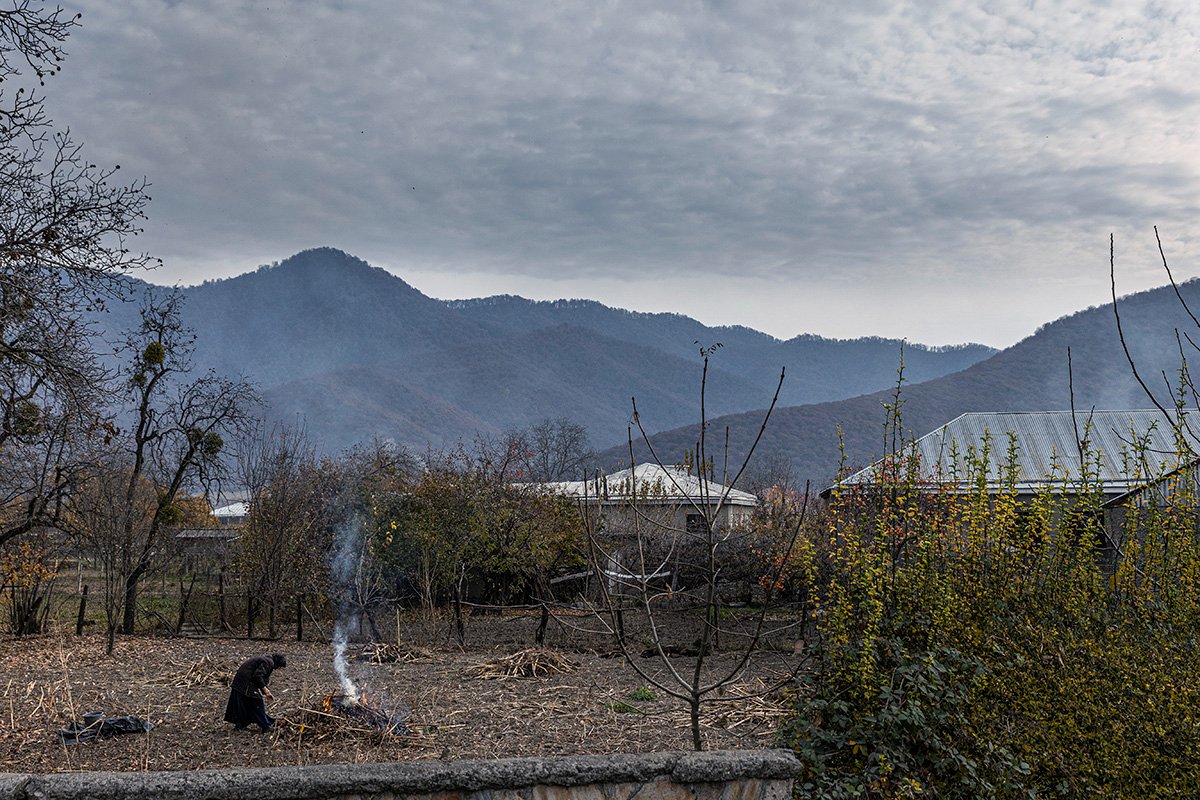
In 2017 unknown people tried to burn down the foundation building. Iza Bekauri, the head of the foundation, said it had to do with them defending women’s rights. Some local men expressed dissatisfaction with the work of the organization.
“It is not known who exactly was behind the arson?” – I make an attempt to learn more about the case with Eteri, when no one else is around.
“No, I don’t know anything, we can’t talk about it, ask about something else,” Eteri answers.
According to Eteri, several women elected to the Council were banned from working here by their male relatives, because it is women’s business to take care of their families. Despite such incidents, there is still a feeling that women have more rights and opportunities here than in Chechnya or Ingushetia, where women rarely open their own business and promote it in other countries, as Nazi does.
Eteri, with the help of Nazi, also opened a guesthouse, which is now mainly run by her daughter-in-law Khatuna. When asked if it is difficult for local women to do business and how men react to this, Eteri replies that her husband and sons, like most Pankisi residents, support them and believe that women should be able to study and work.
—Why do you think there is such a different attitude towards working women or those who study abroad, here and in the North Caucasus? I ask.
— It seems to me that this is due to the influence of the Georgians. They are serious about the education of their children, and we have adopted this to keep up. When it comes to education or work, most Kists do not distinguish between men and women: both should be well prepared in life, Eteri replies.
While we were talking to her, a fair-haired young woman approached us, Louise Mutoshvili. Eteri says she is educated, knows several languages, practices law, teaches history to locals, and is even a municipal deputy.
Louise is 33 years old and stays in Pankisi to develop the area. Louise complains that despite the fact that most of the locals have a good education, it is difficult for them to find a job. Women mostly get jobs in schools and kindergartens, and all the men with whom we managed to talk are engaged in construction.
“I can’t say that it’s hard for women here because of some kind of prejudice. The main problems for both men and women are the same. Now only four thousand Kists live in Pankisi and the population is rapidly decreasing. Someone is moving to Tbilisi, someone else to Europe. There are several reasons for this: both unemployment and problems with the state. For example, there are Kists and Chechens who acquired Russian citizenship in the 2000s, because there was a little more help there than here.
And now they cannot get Georgian citizenship despite the fact that they have been living here for many years. We were also accused of terrorism, the Georgian special services staged special operations. But our main internal problem is disunity, the lack of agreement and some sort of union between ourselves. The locals are divided into a large number of groups that do not get along with each other. For example, before the main word for us was for the elders, their words were a decree that everyone followed. In the 90s people here were not very religious, and with the arrival of refugees, Salafism spread rapidly, and we know how politicians feel about Salafism, they associate it with terrorism,” Louise says at length.
“Previously we had elders who dealt with internal problems and communicated with the government. And now there are many different groups of people who believe that the elders no longer represent them. I myself am very against the authorities. For example, we have village heads who are elected by the elders, and politicians work mainly with them, but for many locals they are no longer authoritative, they do not represent their interests. Because of this, the Kists now have no trust in each other. When Salafists showed up here, it was noticeable that most of the population began tojoin them. There are few followers of Islam, which our elders professed, and now even the Salafis have divided into different groups that do not get along with each other.”
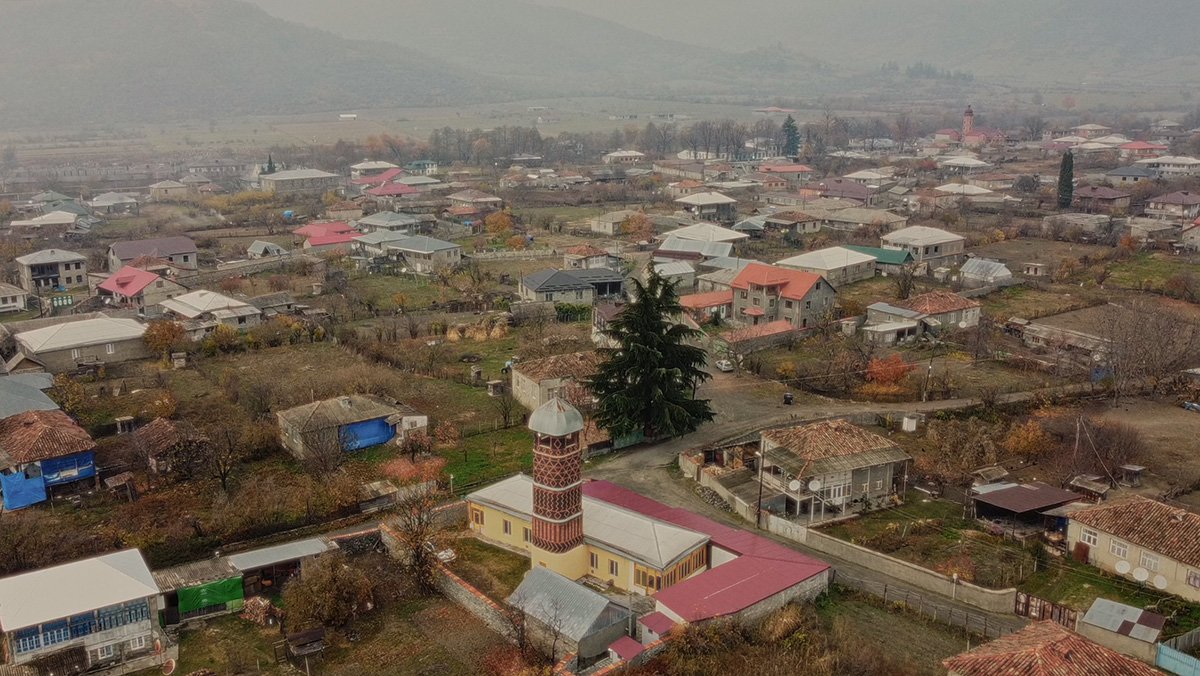
In the Pankisi Gorge there are two mosques: the “old” mosque, where mostly older people profess the “former” Islam, established in the Soviet era, and the new or “red mosque”, where the Salafis go, or “Wahhabis” as they are frequently called here. According to various estimates, from 50 to 200 people from the new mosque went to fight in Syria eight years ago.
Salafism came to Pankisi with refugees from Chechnya and young Kists, who after the collapse of the USSR were able to go to study in Arab countries and gain knowledge about their religion, previously inaccessible to their communities. Salafi Islam turned out to be a stumbling block for the locals — the younger generation began to teach their fathers the “correct religion”, and they opposed it. It is difficult to get into the “red” mosque: strangers are not allowed in, while the “old” one is open to both tourists and journalists. But, as Nazi said, the Kists are reluctant to communicate with journalists; some request not to be asked about politics and say that the locals have no problems, others talk about the difficulties of life in the gorge but demand their names be kept private, citing possible problems with both the Georgian government and the Kadyrovites.
And everyone communicates with us only in Kist.
Muslims must perform Friday afternoon prayers at the mosque, and it was at this time that we ended up in the “old” mosque. We were brought there by a local resident, 21-year-old Said [name changed], whom we encountered on the street when he was riding a bicycle to pray. Said is the only young member of the old mosque whom we noticed during the two hours we spent there. He is thin, a little awkward and shy. When asked why he does not go to the “red” mosque, he answers cautiously:
-Wahhabis go there.
Then added that he doesn’t mean anything bad, but he is a little afraid of them. I couldn’t find anything to answer.
Zikr
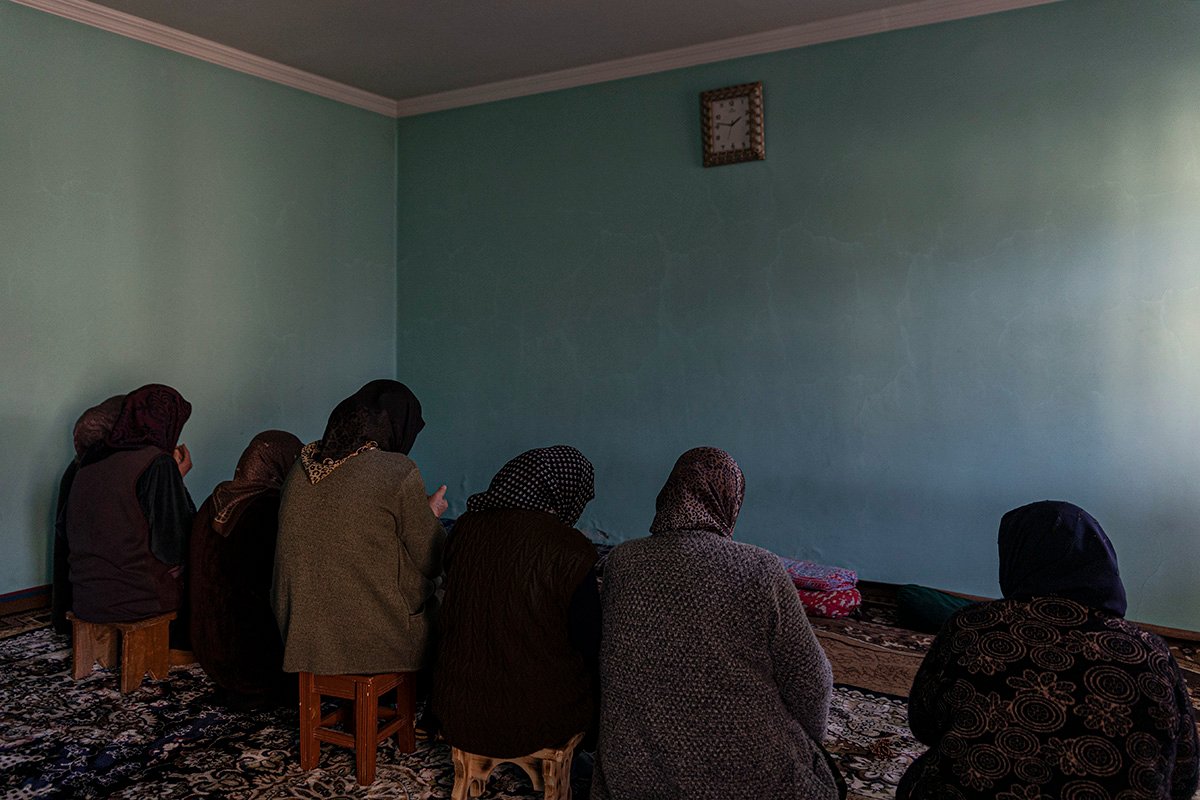
Men pray in the main part of the building, but in the courtyard there is a small extension where women, most often the elderly, go to pray. We enter the room during zikr or prayer, which in Sufi Islam includes singing, clapping, ritual dance and recitation. Seven old women, leading a circle dance, first asked God for recovery for their relative, then began to ask for protection from pressing problems.
“O Allah, let all states live in peace, let there be no wars,” the women prayed in a singsong voice, clapping and stomping their feet.
Women who perform prayers in this way are highly respected among the followers of Sufism in Pankisi; they are often invited to weddings, funerals and movlids, or religious celebrations which Vainakhs celebrate in the month when the Prophet Muhammad was born, or when they want to observe an important event, for example a birth.
The leader of the group, Raisa Margoshvili, a tall and smiling woman in her 60s wearing hijab, told me that she was in a hurry because she needed to go to a few more houses where she was called on to read prayers. When she learned that I was from Ingushetia, she decided to stay. Raisa asked what I would like to ask of God, and, having seated the rest of the women in a circle, began to chant in the Vainakh language to ask for health and happiness for me and my family.
Such ceremonies are not held in the “new” mosque: Salafis believe that they contradict religion and that, as a local resident told us, “round dances” have pagan roots. We met Khalid [name changed] at the exit of the old mosque, and he immediately began to speak unflatteringly about it, saying that they profess the “wrong Islam” there. He himself would like to go to the new mosque, but it could create problems for his family in Russia. The young man says that the Kadyrov authorities do not accept Salafism, believing it to be associated with terrorism. Because of this, those who travel to Chechnya do not go to the “new mosque.
“Like everywhere else, we have a lot of informers. If you go to the new mosque you will be registered as a terrorist, and this information will be passed on to both the Georgian and Chechen authorities,” Khalid says.
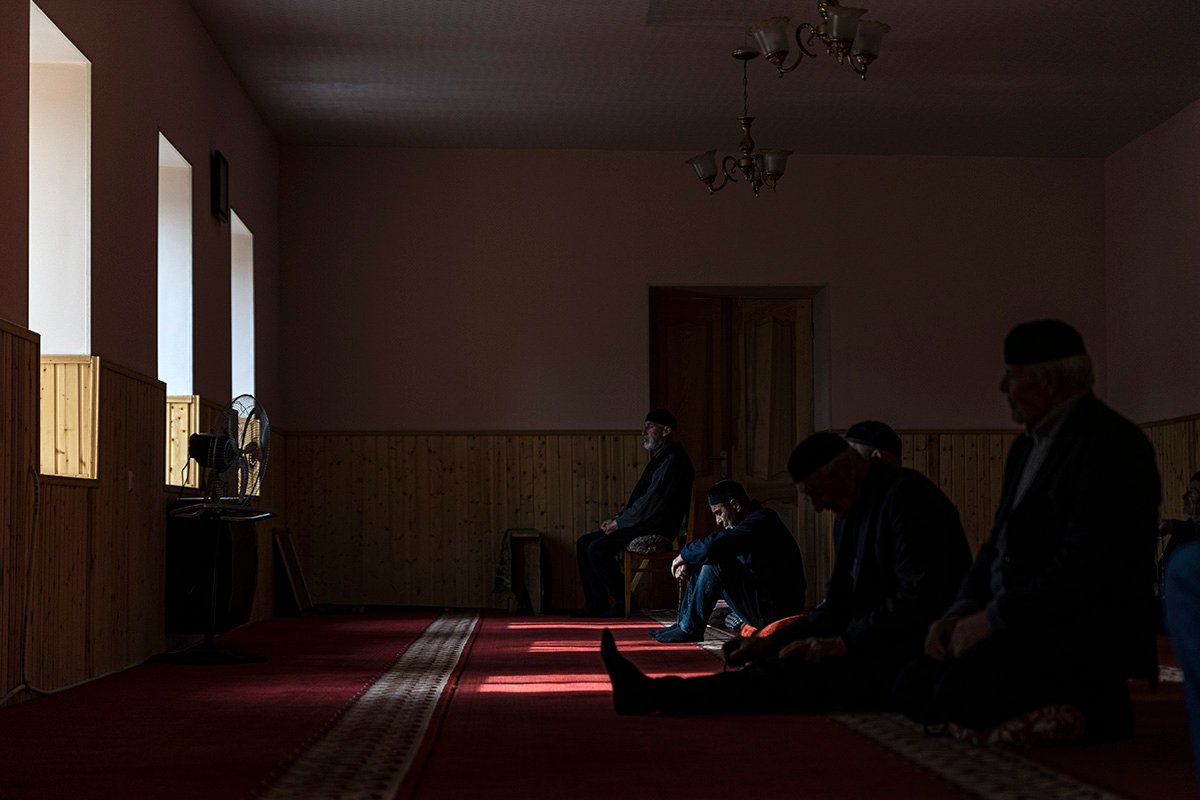
Sufi Islam is promoted on Nazi’s guesthouse website and on the Facebook account of the Association of Tourism. Journalists or tourists are often brought the women’s mosque, because such rituals have an almost hypnotic effect, especially on those seeing them live for the first time.
During our second meeting with Gurjit, he also talked about women from the old mosque – but he did not mention the “redhead”, her parishioners and her reputation. He carefully tried to find out where we went, who we saw and whether the locals spoke to us at all.
“Nazi told me you were from Ingushetia,” Gurjit says. The first time I did not mention this, I gave him the opportunity to tell me about how people live in the North Caucasus, what problems we have and how things are with “terrorism”. “I went to Ingushetia at the beginning of the 2000s, when there were camps for Chechen refugees. This is a dangerous place.”
It seems that Gurjit immediately realized that he reproduced approximately the same stereotypes about Ingushetia, which he himself warned us against in the context of Pankisi.
“Now it’s not dangerous, of course. You don’t have a Kadyrov.”
35-year-old Kerim [name changed on request. — auth.], a parishioner of the “red” mosque, has been going there for several years. According to him, the problem of dividing people into “old” and “new” Islam and the conflicts that arise on this basis are exaggerated.
“I also think that Islam is distorted in the old mosque, but nothing can be done about it, it does not make our old people who go there bad, wrong. My father also goes to the old mosque. All thinking people understand that our fathers did not have the opportunity to receive knowledge about correct Islam, in the USSR it was difficult even to pray, and sometimes this gave them problems with the authorities. But they still preserved our religion in some form, if not for them we would not be able to practice Islam correctly now or we would not have a new mosque.”
Although those we spoke to said it would be difficult to talk with members of the “red” mosque, that they are very strict and conservative, Kerim expressed a rather progressive point of view — that women’s rights must be protected, spoke flatteringly about the Council and proudly talked about how much good women do for the gorge.
— I don’t think that getting an education even abroad or doing business is contrary to Islam. The first wife of the Prophet Muhammad, Khadija, ran a trading business, was the richest and most influential member of her tribe, and the prophet called her the best woman in the community and did not marry anyone else until her death. Only complete radicals who do not know anything about their religion think differently. When the Council was set on fire, many from our mosque helped them recover, helped search for the culprits,” Kerim says, but when asked if they found him, he replies that he doesn’t know.
Like Khalid, he asked us not to give his details, because he is afraid of problems from the Chechen authorities, where he must often travel to visit his parents.
Between the devil and the deep sea
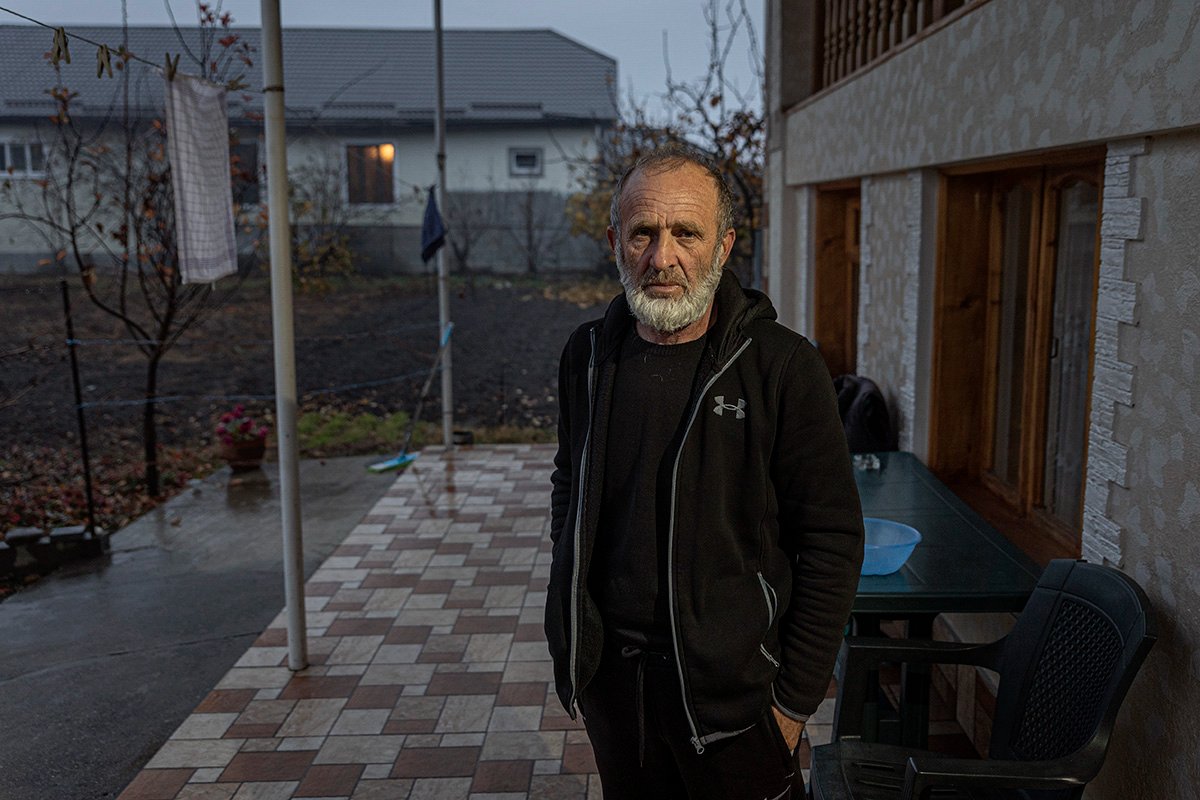
Indeed, the Kists have reasons to be wary — on the one hand the Georgian authorities, who quite recently staged special operations in the gorge to “destroy militants”, on the other the Kadyrovites, who are still trying to control what is happening here.
On the way to the mosque, Said pointed out a large cemetery, located at the foot of the mountain.
“Have you been to the cemetery? In 2017 a local guy was killed, they said that he was a terrorist, he was buried there. That’s why I don’t go to the new mosque: what if they hang this on me too?
He was referring to 19-year-old Temirlan Machalikashvili. His house is located a ten minute walk from the old mosque. His parents and sister still live there.
Temirlan was the only son of Vakhi-Malkhaz Machalikashvili, and in December 2017 he was shot in the head by a Georgian special forces soldier during an “anti-terrorist operation” as he lay in bed. Police announced that Temirlan had ties with terrorists and was shot while trying to detonate a grenade. Temirlan’s family denies these allegations. The Center for the Study of Human Rights and Monitoring NGO says investigation of the killing was a formality. Vakha himself is still trying to discover who shot his son.
We got to Machalikashvili’s house on November 24, the day after the birthday of Temirlan, who could have turned 24 years old. The mistress of the house at that moment was sweeping a neat courtyard, the gray-haired thin Vakha Machalikashvili himself met us dressed in all black. Since the death of his son, he has been a well-known activist in Georgia and an oppositionist to the current government. His ancestors also moved to the gorge in the 19th century, but Vakha and his wife returned to Grozny in the late 80s, from where, due to wars, he was forced to leave with young children back to Pankisi.
-During the second war, together with my wife and three children, I returned from Chechnya. He arranged a life here, educated his daughters, married the eldest. I arranged for my son to study in an IT specialty, there were many plans, they wanted to return to Chechnya, but my plans were destroyed by the Georgian special services that entered our house at night. They killed a son who was not even 20 years old. He slept at that moment in his bedroom on the second floor.
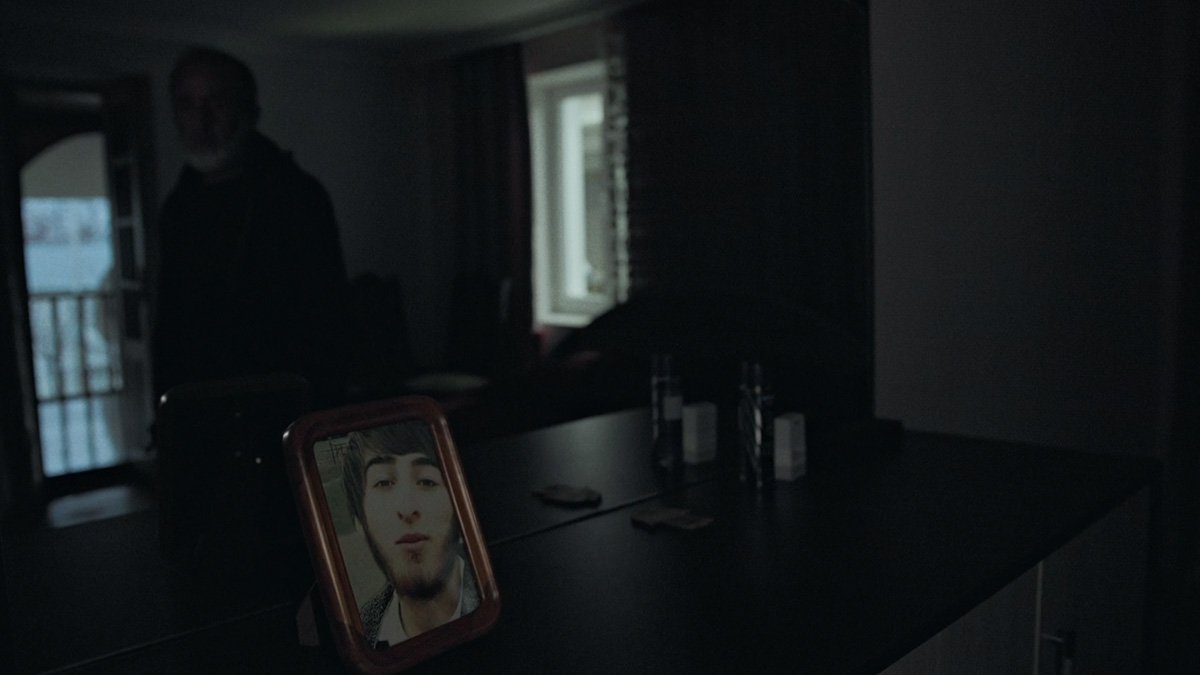
Both the Georgian Ombudsman Nino Lomdzharia and other human rights activists pointed out that the state security service has not provided convincing evidence of Temirlan Machalikashvili’s connection with terrorist groups. However, the prosecutor’s office dropped the case on “exceeding official authority with the use of violence or weapons”, no charges were brought against anyone. The Machalikashvili family sent the Temirlan murder case to the ECtHR for consideration.
Vakha took us to his son’s bedroom, which still looks like Temirlan just went out for a while. The tragic events are reminiscent of a bullet hole on the head of the bed – where the head of a sleeping person should have been, and photographs of a guy in a frame.
“They accused their son of all mortal sins, since December 26, 2017, when they killed him, I have been at war with this government. They tried to break me many times: they offered money, they made an attempt on my life, they threatened me. But they couldn’t scare me, and until I find his killer, I won’t calm down,” Vakha says, tapping his fingers on the table. – So I came into the opposition, became involved in politics. In 2020, in the elections, I could go to the Georgian parliament, but so that the locals would not say that I, using the death of my son, was rushing into politics, I did not participate. Now I have created my own Justice Movement party, and in the next elections I will continue to fight against this government. Everything I do, I do with the intention of getting justice for both my son and everyone who is oppressed by these politicians.
As the “Caucasian Knot” has reported, after the murder of his son Vakh, he pitched a tent near the Georgian government and stood there for about a hundred days demanding that the culprits be found. According to him, the people of Pankisi do not support his involvement in politics, because they are “terribly afraid of the authorities.” Some locals are “even afraid to visit”.
-Such fear is connected with the history of the gorge. When our ancestors moved here two centuries ago, both the imams and the council of elders did not demand their rights in any way. The former Prime Minister of Georgia, Giorgi Kvirikashvili, even said at a meeting with me that for 200 years that the Kists have been living in Georgia, only I began to demand that our rights be respected, to say that we are full-fledged citizens. And before that, we lived here, rejoicing at some small handouts, rejoicing that we were given a low position to get a job.
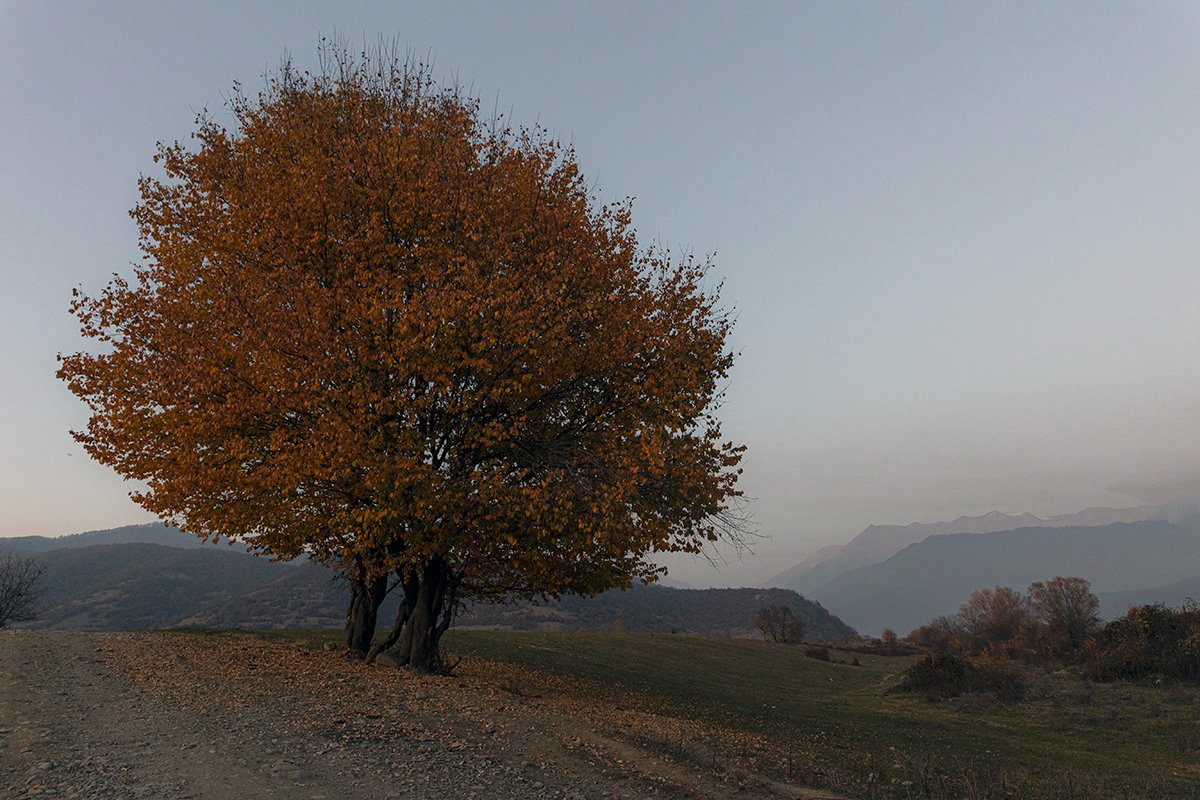
North Caucasians often receive special attention from the Georgian authorities. For example, when Russian citizens fled mobilization to Georgia through the checkpoint in Upper Lars, according to media reports Chechens, Ingush and Dagestanis had trouble crossing the border. They had to wait for several days in a separate room, crammed with people, without food or water, until they were thoroughly checked and let through. Many from the North Caucasus were then turned back.
The Kists from Pankisi tried to help their own people, collected money, transported food, water, and clothes to those stuck at the Georgian border checkpoint Daryali. Several dozen Kists even staged rallies outside the Georgian government demanding that Caucasians be saved from mobilization. Vakha Machalikashvili himself appeared on local opposition TV channels with the same demand. A few days later, Caucasians began to be let through, mostly those who had evidence of transit through Georgia.
I also encountered a similar selective attitude passing through border control after arriving from Latvia. Seeing in my passport “Republic of Ingushetia” as my place of birth, the border guard pointed to a room crowded with policemen and I said I should go there. None of those who went through the control with me had any complaints from the police. But they checked my passport for a long time, asked questions about the purpose of my visit, examined the Latvian visa under a magnifying glass, and in the end they also photographed me.
“They didn’t let six friends through at my place,” Vakha says. “Sources from the Georgian government then told me that the local authorities were afraid of clashes between Russians, who also came here from Russia after the start of the war, and Caucasians. This is how local and Russian politicians put pressure on us. I was banned from leaving Georgia. Because of this, and because the Kadyrovites are opposed to me because of my policy, I cannot get into Chechnya either; they will kill me there.”
Vakha notes that because of this, many Kists have a simple policy: to say that they live well in Pankisi, their relations with the authorities are excellent. As Vakha explains, this is how they cling to at least those living conditions that they have and avoid being labeled “terrorists”.


















